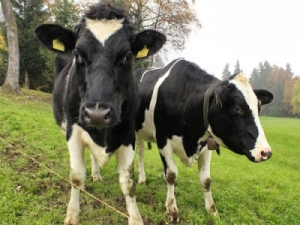DairyNZ Levy Vote Underway as Chair Highlights Seven-Fold Return
Voting has started for the renewal of DairyNZ's milksolids levy.
 The attitude schools hold towards agriculture needs to change to encourage teachers to promote it as a great career choice – especially by young Maori.
The attitude schools hold towards agriculture needs to change to encourage teachers to promote it as a great career choice – especially by young Maori.
DairyNZ's Maori development manager Tony Finch says the industry needs to help cause a paradigm shift.
The attitude schools hold towards agriculture needs to change to encourage teachers to promote it as a great career choice – especially by young Maori.
Research funded by Primary Growth Partnership shows that 9% of the dairy workforce is Maori, and 25% of workers who leave the industry every year are Maori, versus 15% who are non-Maori.
Finch believes that overall Maori are quite well represented in the dairy industry, but says as Maori aspire to make more use of their land, more young Maori will be needed.
The reasons for Maori not taking up careers in dairying are no different from those of non-Maori, he says.
"I don't think it's any different from the local population's view of dairying. It is not a great perspective; it's generally thought to be an isolated job away from the urban areas and this generation doesn't like that much," Finch told Rural News.
"There is a perception of long hours and dirty work and for all those reasons dairying doesn't come across as the most attractive career option."
Finch says when he was at school agriculture was seen as the career choice for 'dummies' and says there are now many initiatives to change the perception school teachers have of agriculture. Teachers are still as influential in forming young people's career choices as they were in his schooldays.
"They need to understand that agriculture is not just hands-on physical work, but covers sciences, finance and a raft of great, exciting and rewarding careers," Finch adds.
"Dairying is quite a different beast these days with technology and the way sheds are designed and the land farmed. There's a need to improve the perception and make people aware of what is happening in the industry."
Finch says for young Maori there are lots of opportunities as Maori set about pooling resources and creating larger, more economic farming units.
"There is a lot of land sitting idle which can be developed and improved and dairy is an opportunity in waiting. As well, there is still a huge amount of productive capability sitting in the industry.
"While there are many great Maori farms, a large number still operate below the industry average productive capability. That often comes down to people capability, so there is a need to get people with the right skills to run a business."
Finch says part of the solution is promoting leadership within Maori youth. He says the Young Maori Farmer of the year competition, run in conjunction with the Ahuwhenua Awards, is one such successful mechanism.
Controls on the movement of fruit and vegetables in the Auckland suburb of Mt Roskill have been lifted.
Fonterra farmer shareholders and unit holders are in line for another payment in April.
Farmers are being encouraged to take a closer look at the refrigerants running inside their on-farm systems, as international and domestic pressure continues to build on high global warming potential (GWP) 400-series refrigerants.
As expected, Fonterra has lifted its 2025-26 forecast farmgate milk price mid-point to $9.50/kgMS.
Bovonic says a return on investment study has found its automated mastitis detection technology, QuadSense, is delivering financial, labour, and animal-health benefits on New Zealand dairy farms worth an estimated $29,547 per season.
Pāmu has welcomed ten new apprentices into its 2026 intake, marking the second year of a scheme designed to equip the next generation of farmers with the skills, knowledge, and experience needed for a thriving career in agriculture.
OPINION: Staying with politics, with less than nine months to go before the general elections, there’s confusion in the Labour…
OPINION: Winston Peters' tirade against the free trade deal stitched with India may not be all political posturing by the…